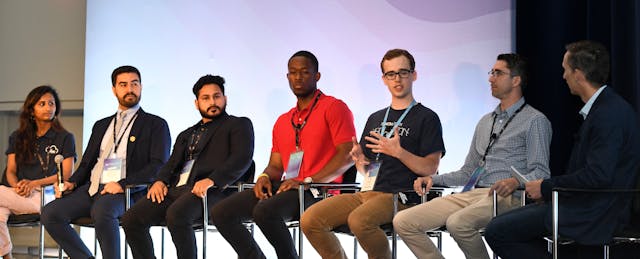WASHINGTON, D.C. — When Dolica Gopisetty was applying for summer internships earlier this year, employers kept telling her that what they valued most in potential hires was strong communication skills and a willingness to learn new things.
And when Nathan Wallace was transitioning from college to the workforce a few months ago, he noticed a similar trend. “A lot of employers are looking for a well-rounded individual with multiple skills, including the ability to communicate effectively,” he said, adding that a penchant for experimentation came up a lot, too.
Gopisetty and Wallace are both in highly technical fields. She’s pursuing an information technology degree, with a focus on cloud computing, at Virginia’s George Mason University, and he’s a recent graduate of Georgetown University’s master’s program in technology management. Yet despite these technical backgrounds, Gopisetty and Wallace, along with four other students speaking on a panel at the AWS Public Sector Summit in Washington, D.C. this week, praised their experiences in the arts and the importance of soft skills as key to setting them up for success in their respective fields.
And it’s not just students who feel this way. Recent surveys have repeatedly found that employers want college graduates with strong soft skills such as critical thinking, problem solving, communication and collaboration.
During the event, Wallace, who now works as a full-stack web developer, noted that his previous experiences as an art handler and a gallery manager share some common threads with the work he does today.
His career in the arts led him to 3D printing and digital fabrication, and “that was my entry point into technology,” he said, adding that coding itself involves a great deal of creativity.
Other students on the panel had similar stories to tell.
Before he was pursuing degrees in cybersecurity and technology, Sebastian Valenzuela was a music composition teacher. The father of one of his former violin students is now his mentor, and they regularly discuss topics like cloud computing and facial recognition.
Jaron Louers, a recent graduate of Maryland’s Bowie State University, said that when he wasn’t learning about network security in undergraduate courses, he was acting in plays on campus.
“That really helped a lot with my communication skills,” he said, “because you have to interact with your fellow actors, and you start to get used to that team environment. In technology, there’s a lot of teamwork going on.”
Louers also mentioned that being a mentor to younger students made an impression on him—in tangible and intangible ways.
“When you’re mentoring younger individuals who may not have as much experience in certain concepts as you, you need to make things as simple as possible so that they can start to build a foundation,” he said, adding that it’s good practice for later in his career when he’ll have to be able to communicate his work in clear, simple terms. “There can be a lot of complex, technical things you’re dealing with, but when you have the ability to translate that into a way everyone can understand, it also helps with your own understanding.”
Gopisetty said she believes her strong soft skills helped her land the internship she has this summer as a software developer at USA Today. She knew she had the technical savvy to land the position, but what gave her an edge was an ability to communicate effectively and illustrate her determination to learn outside of the classroom, she said.
“I think these two are very important, at least coming out of college, because school is very different from the real world,” she said, adding that two weeks into her internship, she has already learned a wide range of new technical and non-technical skills. “Just because you’re done with college doesn’t mean you’re done with learning. You’re still learning—just in a different way.”
The panelists were also asked about the role of humanities in shaping their interests and abilities. Collin Arnett, a student studying computer science at Northern Virginia Community College, explained that what he wants to do professionally can be inaccessible to most people in conversations and in action: “A lot of weekends I like to hide away and work on a [technology] project,” he said. But his humanities education “lets me be on the same playing field, as far as everybody else goes, in conversations” and has helped improve his networking skills.
Wallace said this his grounding in the humanities has reminded him to consider ethics in any conversation about technology.
“It’s really important for technology professionals to think about ethics in everything they do,” he said, “because technology is changing the world so rapidly. If you don’t think about it ethically, you can cause harm, so understanding the impact you might have and thinking through that is critical for all technology professionals.”


